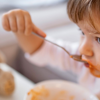Birth trauma: how to recognise when you're struggling

Trigger warning: the following article contains descriptions of birth and baby loss that some may find upsetting.
While becoming a parent is often portrayed as a happy time for some, it can also be tough. New responsibilities and change means that in reality birth and early parenthood can be a traumatic experience.
As a new parent taking the time to check in on your mental wellbeing can seem low on your priority list but how you are feeling matters. Research by the British Journal of Midwifery shows that a third of women find some aspect of their birth traumatic.
We spoke to Dr Andrew Mayers, academic psychologist and birth trauma campaigner, about how mums can recognise they are struggling and get help post birth.
The road to motherhood
The journey to becoming a mum is often a bumpy one, with many women suffering miscarriages, difficult conceiving, or baby loss.
'Birth trauma isn't just about there being a potential threat at the time of birth- it goes all the way back to pregnancy and beyond,' explains Dr Mayers. 'There are families who go through rounds of IVF, which sometimes fails or they lose the baby during pregnancy or stillbirth.'
With so many potential issues around carrying a pregnancy to term, mothers can be become anxious and traumatised by their experiences.
'Whatever the mum perceives to be traumatic, she needs help with that,' says Dr Mayers.
How birth can impact mental health
There are many ways in which a mum can experience poor mental health following the birth of her child. Dr Mayers explains how mums and those close to them can recognise postnatal health concerns.
Postnatal depression
'If a mum feels her mood has changed and she's finding it hard to interact with her infant, and lacks the motivation to do the things she would normally do, and feels guilty, its possible it's postnatal depression. Speak to a GP in the first instance.'
Your Health Visitor is always available for you to speak to in the first instance, or a GP.

Postpartum psychosis
'One thing that it might be difficult for the mum to realise, but others could tell, is if she's having feelings questioning what's real and what's not real- problems with reality. It could well be postpartum psychosis. This can be serious and can lead to the mum being hospitalised.'
Maternal obsessive-compulsive disorder
'Following a birth it can be common to have maternal OCD. Intrusive thoughts stat focussing on the safety of the baby. The lengths that mum may go to to keep baby safe can become disproportionate because she has an intrusive, irrational fear that harm may come to the baby. The mother may be scared to tell anyone, but a professional can help.'
PTSD
Speak to a group of mums anywhere and chances are that some of them will describe what happened during the birth of their child in a negative way. However, while the memories of a difficult birth will fade and be manageable for some, for others certain symptoms can become overwhelming.
One practical step you can take is talking to your health visiting team and arranging a birth reflections session. Supported by your local NHS trust these confidential sessions led by mid-wives are an opportunity to talk through your feelings and timeline of your labour and birth.
'It's about the intensity and the duration,' explains Dr Mayers. 'It's normal after an event to have memories that persist, and in some cases experience nightmares and flashbacks where you're living every moment- the sights, the sounds, everything. But when the intensity of those symptoms goes past a month and affect the way a person can function, then it can cause a problem.'
The life-altering experience of going through a major medical event-birth- and then arriving home with a demanding newborn baby proves hard to adjust to for many mothers. For others, however, symptoms persist and become post-traumatic stress disorder.
'There's a lot to process at the time, but if after a month after giving birth you feel like your emotions are changed- you feel numb and can't experience happiness, sadness, anger, guilt, anything, then that can be an indication of PTSD,' says Dr Mayers.
If you recognise these symptoms in yourself, speak to your Health Visitor or a medical professional who can help.
Parental guilt
As parents we can often feel the fear that we aren't good enough for our kids. Being responsible for the survival of a helpless baby is worrying, and parents can lose confidence. This can manifest into feeling like life is too difficult to cope with, and for some, further guilt about not enjoying parenthood.
'What comes with becoming a parent is intense guilt, and an idea that 'I shouldn't be feeling this way,' says Dr Mayers.'But at the end of the day when it's a mental illness you can't help feeling that way and we need to be able to get you the help around how you're feeling.
'This is what sets apart perinatal mental health from any other mental health for me- there is so much guilt and responsibility, like breastfeeding and interacting with an infant.
'Talk to somebody. Remember that you're not alone. Other people feel the same way. It's common to have those feelings of guilt and doubt. If it's intense and interfering with the way the person functions and has an impact on themselves and their family then get medical help.'
Dr Mayers is speaking in parliament on 11th March in a public inquiry into birth trauma. To find out more about his work visit his website.
Across Spurgeons we run groups that support new parents to find their community and learn skills that will help them enjoy their new role and be more comfortable with their new responsibilities. New parents will need to talk through their birth experience and our new baby courses are an opportunity to talk safely and most importantly make new friends. Search our map to find what is available locally to you.
Related articles from Spurgeons
View all

